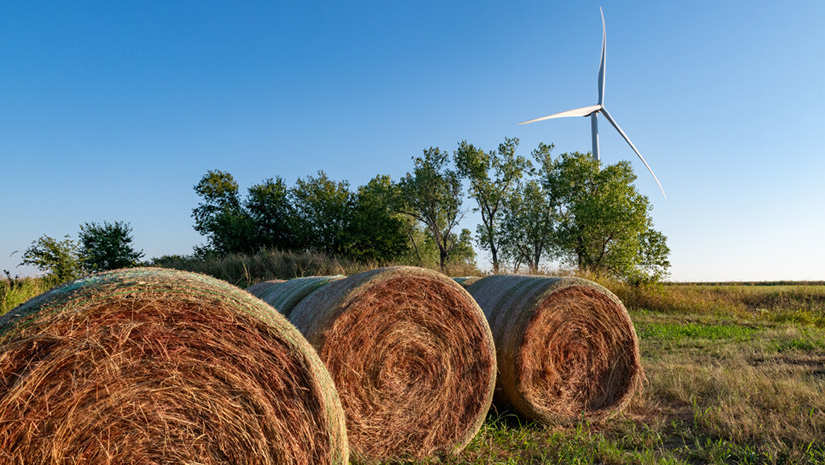Partnership With USDA Highlights NREL's Value in Addressing Rural Renewable Energy Questions

Farmers and rural small businesses in the United States are interested in transitioning to renewable energy and increasing energy efficiency for their businesses. The number of farms using renewable energy grew to over 150,000 in 2022—a 15% increase from 2017— but there is ample opportunity and work to be done to offset the 10.6% of U.S. greenhouse gas emissions that farming activities produced in 2021.
Recognizing farmer and rural small business interest in clean energy, the U.S. Department of Agriculture (USDA) offers grants to advance renewable energy systems and energy efficiency improvements through the Rural Energy for America Program (REAP). USDA has partnered with the National Renewable Energy Laboratory (NREL) to provide technical assistance to USDA's grantmaking operation, as they saw an increase in applications and in the complexity of the technologies and systems proposed.
"USDA's goals for REAP align with what NREL does, so a partnership makes sense," said NREL's Carishma Gokhale-Welch, partnership development manager for the federal sector of the Strategic Partnerships Office. "From capacity building to trainings and technical assistance, there are a variety of ways NREL supports partners. NREL can amplify USDA REAP by leveraging tools, capabilities, and subject matter expertise to support partner priorities that intersect with energy and promote the program to new eyes and new stakeholders."
USDA REAP can fund multiple renewable energy and energy efficiency technologies, but funding has primarily gone to solar and energy efficiency projects. With the Inflation Reduction Act (IRA), REAP received direct funding to encourage other project types to apply through the creation of an Underutilized Technology Fund.
"Combined with an increase in hiring to handle the additional funding, REAP staff are now being asked to review proposals for technologies that are less common, such as distributed wind, geothermal, and anaerobic digesters," said NREL's Ian Baring-Gould, program manager in wind research. "NREL provides technical assistance to ensure REAP applicants can develop proposals that incorporate these new technologies, and supports REAP staffs' technical review of proposals that are more complex."
NREL brings unique technical expertise to assist USDA and broaden REAP's reach while expanding technology options. "NREL's resources and convening ability has also facilitated additional applicants who, to date, have not thought about REAP as a source to support the deployment of renewable technologies in support of rural farms and agriculture businesses," Baring-Gould said.
In addition to NREL's direct partnership with the REAP program, a team of the laboratory's researchers is also supporting REAP's underutilized technology goals through the RAISE initiative, a new partnership between USDA and the U.S. Department of Energy to support small- and medium-sized farms.
NREL Partnerships Advance Renewable Energy Projects
NREL works with large and small organizations to develop research partnerships, license NREL technologies, support cleantech stakeholders, and foster the clean energy economy. "NREL possesses extensive, trusted expertise, research, and resources and tools that are valuable to potential and established partners," Gokhale-Welch said. "Partnering with NREL allows organizations like USDA to tap into those assets and apply them very specifically to meet their priorities.'"
NREL works with a variety of partners with varying needs, so the goal of any partnership for NREL is to understand partner questions and strategize on how NREL can support organizational goals around those questions. The lab's expertise and tools may help partners answer questions they may not have capacity to answer. Those questions may also allow NREL researchers to explore focus areas they have not yet studied. Partnerships also allow NREL to move research to application.
"The understanding and expertise that comes with years of working on these questions enables NREL to anticipate or respond to needs a partner may not have considered," Gokhale-Welch said. "Discussion is central to understanding how NREL can best work with partners."
Learn more about NREL's work with USDA REAP, and find resources like upcoming webinars, past webinar recordings and slides, and audio segments designed to assist REAP applicants. Explore NREL's various partnership options and read about past successes and current cases.
Last Updated May 28, 2025
